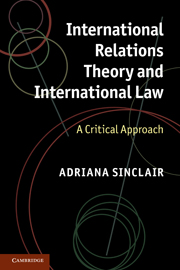Book contents
- Frontmatter
- Contents
- Acknowledgements
- Introduction
- 1 The theoretical foundations of constructivism and its treatment of law
- 2 Challenging the common sense idea of law
- 3 Introducing critical jurisprudence
- 4 Brown, desegregation and racism in America
- 5 Constructing rape
- 6 Law and normative backsliding
- Conclusion
- Bibliography
- Index
5 - Constructing rape
defining the problem and finding the solution
Published online by Cambridge University Press: 05 June 2012
- Frontmatter
- Contents
- Acknowledgements
- Introduction
- 1 The theoretical foundations of constructivism and its treatment of law
- 2 Challenging the common sense idea of law
- 3 Introducing critical jurisprudence
- 4 Brown, desegregation and racism in America
- 5 Constructing rape
- 6 Law and normative backsliding
- Conclusion
- Bibliography
- Index
Summary
Introduction
We saw in the previous chapter that our ideas about law may depart substantially from the reality. Brown is perhaps the most honoured and admired of all the Supreme Court rulings and it is underpinned by the common sense idea of law which forms a central part of a narrative about law. Law therefore is the path to justice; that which solves racism and desegregation in America rather than that which maintained and protected it. Counterpoising Brown against Plessy forces us to rethink the idea of law as unproblematically being able to solve serious social issues like racism. This chapter’s focus on rape legislation and reform in the United Kingdom will push this issue further. In Brown and desegregation, injustice existed at the level of the wording of the law. The Supreme Court moved from stating that segregation did not violate the constitution to stating that it did. In changing the words, and the rules, of law, the Supreme Court changed society by removing segregation and removing the legal sanction from the doctrine of separate but equal. Justice was therefore produced by a change of rules.
Rape legislation will illustrate how this understanding of law needs to be complicated. In rape law we have a very clear statement of what the law is and at the level of the words of the law, there is no obvious unfairness or discrimination. Indeed, it is only relatively recently that the idea that there is a problem with the legal treatment of rape has become commonplace. So if the problem with rape law is not the legal rules itself, what is the problem? Where is it? And how do we fix it?
- Type
- Chapter
- Information
- International Relations Theory and International LawA Critical Approach, pp. 110 - 140Publisher: Cambridge University PressPrint publication year: 2010



